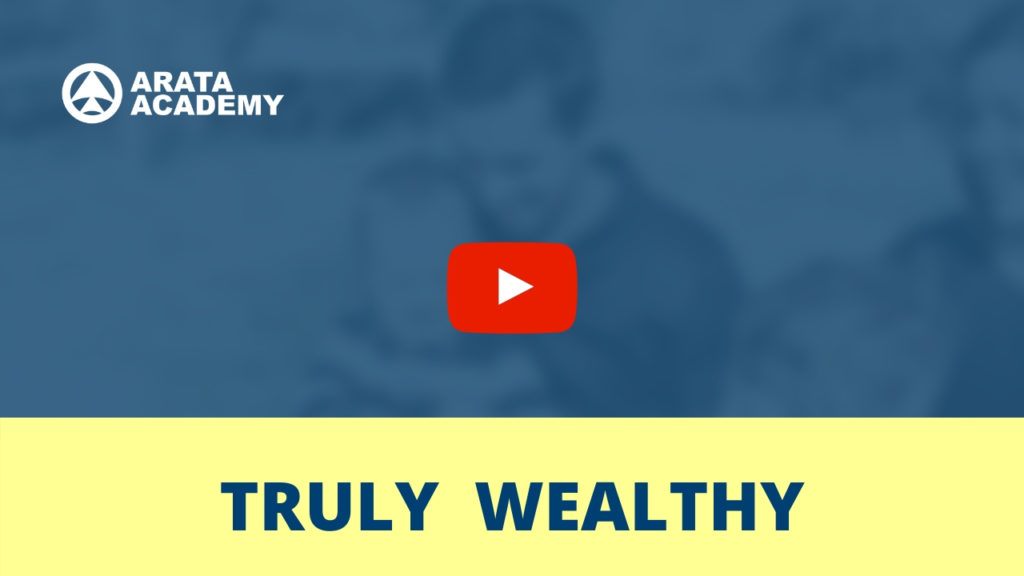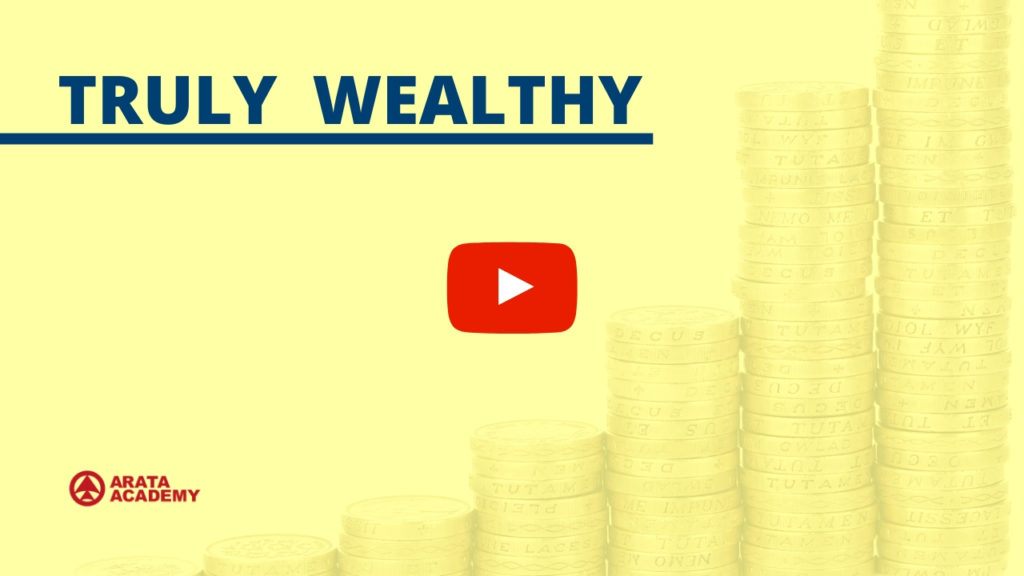Just imagine, earning nine million pounds … and spending it all. This is what happened to a garbage collector in England named Michael Carroll.
He won the lottery and spent all the money. Today, he’s wishing he still had his job at the junkyard.
You probably also know stories about people like Michael. Before criticising these people, we should reflect on how our behaviour can reflect Michael’s in certain situations. I like to call this analogy the FOUR HORSEMEN OF POVERTY.
These are four elements that make us act in a financially unintelligent way. What are they?
The first one is the psychology of consumption
Number 2 is our cultural and biological evolution
Third is our family’s influence
The fourth factor is our habits
In our Financial Enrichment Course, Truly Wealthy, we’ll explore in detail how to change your mindset to protect yourself from the Four Horsemen of Poverty. I promise that we’ll make this introductory video a quick one.
When speaking about the psychology of consumption, I always fall back to one BBC documentary, called The Century of the Self. This documentary tells the story of Edward Bernays and the family of the famous Sigmund Freud, who understood the importance of many symbols in our lives.
Edward Bernays was Freud’s nephew and we can say that he was responsible for women being smokers today. Why? Because at the beginning of the last century, it was a very strong taboo for women to smoke. Then George Hill, the president of the American Tobacco Corporation showed up and told Bernays, who was a consultant at the time: “Look, I’m losing half of my market because of the taboo of women not smoking. What can we do about it?”
Bernays went deep into the research of our psychological behaviour to understand the symbols that make us act in an irrational way. For this, he used various theories proposed by his uncle Sigmund Freud, and he discovered that there was a connection between the cigarette and phallic symbols, symbols of power.
From there, he decided that if he could connect the idea of smoking cigarettes with defying male power, he could make women smoke.
But how would he be able to manipulate the masses in this way? He knew that every year, in New York, there was an Easter parade that got a lot of public attention.
Bernays agreed with high society debutantes that they would hide cigarettes inside their dresses and when he did the sign, they would light the cigarettes and start smoking. At the same time, he had connections with some photographers and journalists and said: – stay in that corner and when I signal you, you’ll see something quite interesting to photograph.
The photographers joined the young debutantes and took pictures that were printed on the covers of all the American newspapers, and even some international ones with a rather symbolic headline, saying Women Light the Torches of Freedom!
This became connected with a symbol that was loved by the whole of society, the Statue of Liberty, and spawned a public debate. In this debate, women who agreed that women should have more power and independence began to smoke. This is an extremely irrational attitude (what do these two things have to do with each other?) This just goes to show how Bernays knew exactly how to play on peoples’ desires and emotions.
There are other very interesting stories, such as Betty Crocker, the company that manufactures instant cake mixes. Betty Crocker created an instant recipe in which you just add water, mix it up and put it in the oven, but no one would buy it. So, they went to Bernays and said: “Why doesn’t anyone buy our cake mix?”
Let’s remember that this all happened during a much more sexist period, where the mentality was different. In this context, Bernays found that when women bought the ready-mix cake, the preparation was so quick and simple that they felt guilty and lazy. It felt as though they weren’t putting in the effort to deliver something to their family.
The businessmen asked:
“What can we do to fight this psychological barrier and get them to buy it?”
Bernays said it was simple: you just had to break two eggs and mix them in with the instant-prepared bundle. Again, it’s a more symbolic act. Egg breaking makes the process a little more “homey”, rescuing that magic, that alchemy of the kitchen despite having little relevance in the taste of the final product. It was the small detail that made women feel guilty. Once they made this change, sales started to rise.
Okay, but what does this have to do with our financial lives? All of our buying decisions have a strong symbolic burden on how we define our identity. Write down this statement, as it’s very important: Buying decisions have a strong symbolic burden on our identity.
Why do I use a particular perfume? Why do I drive a certain car? It’s all to do with the PSYCHOLOGY OF CONSUMPTION, which greatly influences our identity. This was the first Horseman of Poverty: we have to tame the psychology of consumption in order to protect ourselves from the persuasion of marketing.
To learn more about the psychology of consumption, visit this link here – this link will also be available at the end of this lesson.
The second Horseman of Poverty is the genetic and cultural evolution related to our habit of consumption.
This idea comes from Spencer Wells’ Pandora’s Seed, which is about an anthropologist who studied how agriculture influenced many elements of society and our health. He goes on to say that problems like diabetes and even global climate change are side effects of agriculture. How does this apply to consumption? When we find something we want, our instinct motivates us to consume it immediately. We have a desire for immediate gratification.
In the past, when finding a tree with fruits or a suitable animal for hunting, the ideal thing to do was to consume it immediately, as there was no guarantee of where the next meal would come from. Therefore, we’re all influenced by the impulse of immediate consumption. In fact, when it comes to food, our body stores energy, in the form of fat, to survive longer. But today, with access to refrigerators and supermarkets, we no longer need this mechanism. Regardless of this fact, it’s a mechanism that continues in our body, our genes and especially for those who overeat the wrong foods, which can cause overweight and a risk of heart problems.
Similarly, our natural instinct for immediate gratification is what makes us want to go on a shopping spree as soon as we get paid. So, when we haven’t tried to control our behaviour, and are relying completely on our instincts, we end up behaving like Michael Carroll the bin man, who we spoke about before.
The third Horseman of Poverty is our family’s influence. This is a very delicate point, so I ask your permission to comment generally on what happens to some people, not all of them obviously, but mainly those who don’t come from a family that has a solid financial education.
Here’s an example: You’re a child and occasionally your parents come home, grumpy, telling you how terrible their day at work has been, and from when we’re young, we’re exposed to all these negative stories, giving us the message that a boss is always mean. Another example: when a family argues, and eventually money becomes part of the fight, we create a bad association that money leads to arguments. Another situation is when you also hear in childhood how your parents would like to do something but have no money. The money here appears as a symbol of limitation. Remember the importance of the symbols and the whole history of Freud? These are all just a few examples of the kinds of situations in family environments that can unconsciously generate negative emotions towards money. We don’t want to love or hate money: money is a tool, it’s an object. It’s up to us to know how to acquire and use it correctly, without an unnecessary emotional burden.
Lastly, the fourth Horseman of Poverty appears in the form of our habits. There are people watching this video now living day by day guided by habits of wealth. Other people follow day after day oriented by habits of poverty.
How does a habit of poverty manifest itself? There are several ways, and I’ll try to illustrate them for you with a concept that you’ll find very useful: opportunity cost.
In an episode of The Simpsons, Homer is driving the car with his son, Bart, and they find a truck lying on the side of the road. It was carrying sugar. Homer keeps jumping for joy, saying he’s going to get rich. He starts filling his car with sugar and decides to turn into one of those door-to-door sellers, selling sugar.
His wife Marge, who as always is the sensible woman in the story, says she doesn’t like this plan, and that even Homer’s colleagues had rung her to ask why he didn’t show up to work. They’re all worried that he won’t go back. Homer’s reply is: “Don’t worry, Marge, look – I have a dollar! I found it on the ground while I was at the bus stop.”
Marge says that while Homer earned a dollar, he missed out on earning forty dollars by not going to work. In a very simple way, this little story illustrates the idea of opportunity cost.
What are we doing today? Using our time, our resources, our focus of attention? Are we letting go of other better opportunities?
For example, let’s say that you’re going to buy a fancy brand-new car. Seventy thousand cash. Did I only spend 70 thousand dollars by buying the car? Or did I give up more than that, since I could have invested that money into a good investment, yielding half a percent a month over ten years could ultimately have turned into 127 thousand dollars?
This shows how there can be different perspectives to understanding our choices. There is no right or wrong. Everything depends on our preferences, our priorities. Some choices, however, are aligned with habits of impoverishment and other choices are guided by enrichment habits. The main point here is that our behaviour is guided by the habits that we implement in our day to day lives, which in turn have very strong impact on our financial future.
I promised that this would be a very quick video presentation of the Truly Wealthy financial enrichment course (and indeed there are five horsemen of poverty – the fifth horseman, fear, is so complex and powerful that it needs more time to be explained, maybe even its own video!). If you found this video interesting and want to learn more, visit this link, where you’ll find a lot of important information. The login details are only sent by email once you’ve registered using the form on the website.

